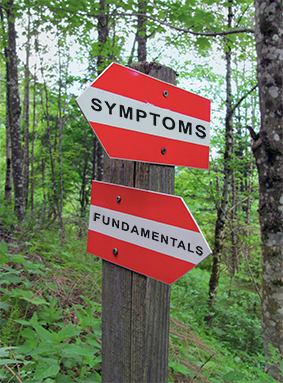Warren Kinston
9. September 2012 10:00
Faced with a problem, should we focus on symptoms or on the fundamentals that generate those symptoms?

What does your common sense tell you? In practice, we know that it is often a difficult choice.
THEE was developed with the belief that a scientific identification of fundamentals in personal life was possible. It differed from the usual social science approach in making the focus of observation (and validation) people in the midst of committed action. A person who is committed is an entirely different being from a subject in a psychology experiment or a random respondent in a social survey. More...
About
Warren Kinston
Warren Kinston
29. June 2012 18:00
The problem with freedom of belief is that scientists now think they have the answer. Theories are now given the status of truth. So subjugation by the church has been replaced by subjugation by science and ideology.

One superstition is replaced by another. As a result, the battle to promote beliefs in education is intense.
But the flag I want to wave is emblazoned with freedom. So let's see where that takes us in regard to education.
My starting point is that the emerging 21st Century enlightenment must help us all move away from superstitious dependence on ideologies and theories. (Of course, they must not be rejected because of their misuse by many, anymore than the Church should be rejected because of its misuse by many.)
I look to an era of freedom of thought and, at a personal level, I suspect that this cannot be separated from freedom of belief. We think and think and think, and then we come to believe. Strangely, More...
About
Warren Kinston
Warren Kinston
23. June 2012 09:00
Science has beliefs and people believe in science. Should they? Is this what was meant by freedom of belief?

Wasn’t that one of the basic freedoms we learned at school? Or was that freedom of speech? Or thought? Or worship? But then speech and thought and worship are all close companions to beliefs.
I am a champion of freedom of belief and freedom of thought. So I am sensitive when these freedoms are under threat. And they are. Freedom of belief is not being threatened from the pulpit or by church-backed governments these days. We have moved on. Instead, it is under threat from science and politics.
Let’s leave political ideology for the moment, where people demand that politicians proclaim beliefs and they hypocritically comply. This is so obvious and silly.
Let’s focus on science instead. Whiter than white and disdainful of political shenanigans, science has become the new political correctness. More...
About
Warren Kinston
Warren Kinston
29. May 2012 12:00

Prediction in science is easy, if it's a physical science. But not too much should be expected from findings in the social sciences—so says a Professor of Philosophy. How right he is. He was asking if social science is useful for guiding public policy. But is that the correct question?
The question here is not whether social science is useful or not for prediction. (Most of it is pointless or even harmful in my view.) The issue is whether prediction is possible in relation to social life generally and public policy specifically. Having clarified that, we can consider what assistance from academia might be required. More...
About
Warren Kinston
Warren Kinston
23. May 2012 10:00
 Are you and your brain essentially the same thing? There is a materialistic fashion at present to answer: "Yes. Of course, how else could it be?" But: It could be that transcendental ideas are relevant and some medical scientists would agree.
Are you and your brain essentially the same thing? There is a materialistic fashion at present to answer: "Yes. Of course, how else could it be?" But: It could be that transcendental ideas are relevant and some medical scientists would agree.
However, in recent years scientific fellow-travellers have fallen in love with a reductionistic neuroscience. They have no trouble writing sentences like:
When we are deprived of sensory input, we generate images using our memory and keep our consciousness agents busy by playing back memories.
But do «we» generate those images? Do «I» play back memories? Or do such things happen to me/us? Do you reach puberty or does puberty happen to you? Do you grow old? Or is aging happenstance?
There is an enormous difference More...
About
Warren Kinston